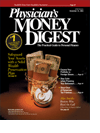Publication
Article
Physician's Money Digest
Expose Your Portfolio to Foreign Dinero
Author(s):
If you believe, as many experts do, that the dollarwill continue to fall because of the budgetdeficits, trade deficits, and other looming politicaland economic problems, you may want tohave some foreign currency exposure in your portfolio.Warren Buffett seems to think that this is a goodidea; he has taken large positions in foreign currencies.So, what is foreign currency exposure and howmight you benefit from this investment strategy?Let's look at an example.
Formulating a Strategy
Suppose it takes $1.30 to buy 1 euro, and youthink that in the future the dollar's value will fall to$1.50 per euro. If you buy $100 of euros today, youwill receive about 76.9 euros. In the jargon of thecurrency markets, this is called "shorting the dollar"or "going long the euro." Then, when the dollar fallsto $1.50 per euro, you will be able to convert youreuros back to about $115.40 (76.9 x $1.50). That'sa gain of 15%.
Because you are a dollar-based physician-investor,buying euros means taking on foreign currencyexposure. As the example shows, you will benefitif the currency you are short (ie, the dollar) falls.You will, of course, lose money if it rises. So beforetaking on any foreign currency exposure, you shouldstrongly believe that the dollar will fall.
Ways to Gain Exposure
The purest and most efficient way to create foreignexchange exposure is to buy foreign currenciesin the futures markets. But these markets are shark-infestedwaters. Amateurs should stay out of them.Two less risky options often suggested are buyingtraveler's checks or CDs in a foreign currency. Butneither option is very attractive.
In the case of traveler's checks, the transactioncost is high and you will earn no interest for the periodyour money is tied up. In the case of foreign CDs,transaction costs can also be high and it may be difficultto find a bank that offers foreign currencyCDs—not all banks do. The CD option is probably abetter option than the checks because you will earnsome interest while you are waiting for your predictionto come true.
The more practical option for most of us is to buymutual funds that invest in foreign stocks or bonds.Of course, in either case, you will be taking on therisks inherent in the stocks or bonds that the mutualfunds hold. If the dollar falls against the currencies inwhich the stocks or bonds in the funds are traded,you will benefit. This year, many mutual funds haveseen positive returns because the dollar has beenfalling against many currencies.
An additional advantage of buying a foreignstock or bond mutual fund is that you will get exposureto several currencies at the same time (ie, currencydiversification). Each fund generally holdsstocks and bonds of many countries, not just one.The exception is single country funds, which youshould generally avoid because of their high risk.
What to Expect Next
If you decide to take the mutual fund route, onething you should be aware of is that many mutualfunds hedge their currency risk. They enter into sidetransactions to ensure that the fund will neither gainnor lose because of changes in the value of the dollar.
Why do they do this? The managers of thesemutual funds believe that over time the gains andlosses from currency fluctuations even out. Nothedging the risks makes fund prices more volatilewithout any commensurate benefit in the long term.This is too complex an issue to thoroughly explainhere. However, if you are buying a foreign stock orbond fund to bet on the fall of the dollar, you do notwant a fund that hedges its currency risk. So, beforeyou make your investment, find out a fund's currencyhedging policy.
On the foreign bond side, one good fund thatdoesn't hedge its currency risk is the T. Rowe PriceInternational Bond fund (RPIBX). Another goodfund that actively manages its currency risk (ie, themanagers decide how much currency risk to take on)is the Loomis Sayles Bond fund (LSBRX). On theforeign stock side, none of Vanguard's foreign stockindex funds hedge their currency risk. So, if youwant to bet that the dollar will fall against the poundand the euro, there's the Vanguard European StockIndex fund (VEURX).
Remember:
Keep in mind that all of the experts who claimthat the dollar will keep falling could be wrong.Make sure that you like the fund you buy and arenot buying it just to get currency exposure.A knowledgeable and experienced manageris what makes or breaks a fund.
author of The Only Proven
Road to Investment Success (John Wiley; 2001)
and Financial Modeling Using Excel and VBA
(John Wiley; 2004), currently teaches finance at
the Fordham University Graduate School of
Business and consults with individuals on financial
planning and investment management. He welcomes
questions or comments at chandansen@aol.com.
Chandan Sengupta,
